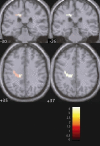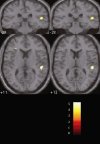Functional anomalies in healthy individuals with a first degree family history of major depressive disorder
- PMID: 22738278
- PMCID: PMC3384259
- DOI: 10.1186/2045-5380-2-1
Functional anomalies in healthy individuals with a first degree family history of major depressive disorder
Abstract
Background: Individuals with major depressive disorder (MDD) process information with a bias towards negative stimuli. However, little is known on the link between vulnerability to MDD and brain functional anomalies associated with stimulus bias.
Methods: A cohort of 38 subjects, of which 14 were patients with acute MDD and 24 were healthy controls (HC), were recruited and compared. The HC group included 10 healthy participants with a first degree family history of depression (FHP) and 14 volunteers with no family history of any psychiatric disease (FHN). Blood oxygen level dependence signals were acquired from functional magnetic resonance imaging (fMRI) during performance in a dot-probe task using fearful and neutral stimuli. Reaction times and the number of errors were also obtained.
Results: Although MDD patients and HC showed no behavioral difference, the MDD group exhibited smaller activation in the left middle cingulum. The MDD group also showed smaller activation in the left insula when compared to the HC group or the FHN group. Finally, FHP participants exhibited higher activation in the right Heschl's gyrus compared to FHN participants.
Conclusions: The present study shows that family risk for MDD is associated with increased activation in the Heschl's gyrus. Our results also suggest that acute MDD is linked to reduced activation in the insula and anterior cingulate cortex during processing of subliminal, not recognizable, masked fearful stimuli. Further research should confirm these results in a larger cohort of participants.
Figures


References
-
- Rosenberg EL. Levels of analysis and the organization of affect. Review of General Psychology. 1998;2:247–270.
LinkOut - more resources
Full Text Sources

